The whole purpose of using RV converters is to reduce the dependency on RV batteries. Hence, you can guess the answer to the question, will an RV converter work without a battery?
Yes, it will work without a battery connection as long as you are using AC shore power. The converter’s job is to reduce the 120V AC output to 12V DC output making it suitable for small appliances.
In this article, I will try to explain how an RV converter works so that you can understand how to power the appliances in different situations. Also, you will know whether it is good to use an RV converter without a battery.
How Does A RV Converter Work?
A converter’s job is to simply convert the 120AC into a 12V DC which is required to run the appliances.
Whether you are connecting the necessary components to a standard electrical connection or shore power, a converter is a must.
It has become a standard to use the converter to power all 12-volt appliances in your RV.
When the RV is not connected to the grid, the batteries in your vehicle can power the accessories.
As soon as you get the chance to use shore power, the converter not only helps run appliances but also recharges the battery.
Therefore, the battery doesn’t get drained completely, and its lifespan doesn’t get reduced too quickly.
But this kind of functionality is not available in all converter models. While buying an RV converter, carefully fix your requirements and buy accordingly.
Will an RV Converter Work Without A Battery?
I have already told you in the introduction that an RV converter works perfectly even without a battery.
The answer will be the same to another question, will an RV converter work without a battery?
The modern converters are smart enough to detect a few things and work perfectly fine without a battery present in the system
You can understand the mechanism by reading the previous section. Here, I want to tell you whether it is a good practice or not.
Should I Run Converter Without A Battery?
First of all, you have to understand that the job of a converter is to work as a helper of the batteries.
What I mean is that it works on top of your RV battery backup system. When the battery is not present, it poses some threat to the converter.
Without a battery in your RV, the converter has to work harder to keep the appliances running.
And, it can fail because converters are not designed for continuous support.
Moreover, high loads occasionally drawing more power than usual can also reduce the life of a converter.
The role of a battery alongside the converter is to regulate the voltage. Without a battery, low-power appliances can get burned due to a surge in the shore power.
Also, think about the time when you are far away from shore power.
Your trailer may have trailer brakes and breakaway cables that are practically dead without battery power.
So, please don’t rely too much on the converter or the battery. Both are important for a functional RV.
Lastly, I want to add to the discussion that you must choose the right converter size. In this article, you will know the parameters and factors that are required to find out the correct size and type.
Will RV Fridge Work Without Battery?
Yes, your RV fridge will work without a battery; in fact, they are not even meant for continuous running on battery power.
All trailer fridges are designed to work with propane. There are some hybrid models suitable for battery power.
Still, those specific models are not recommended to run more than 12 hours on battery in any case.
Some of you may think of running the fridge with AC power instead of a battery. But you should know that the electric bill will be through the roof.
Even though using only a converter to power refrigerators is tempting, you should not do it.
Conclusion
So, will an RV converter work without a battery? Yes, it will. The real confusion here is whether one should do it or not.
As you have known from the above discussion that both battery and converter are important for the trailer, the best practice is to use both of them.
When the appliances are meant to be running for long hours, the battery is the best solution.
And, the converter comes into play after connecting the system to the shore power. I hope that you don’t omit one to cut costs because it will only introduce more problems and maintenance costs.
Related Posts:


